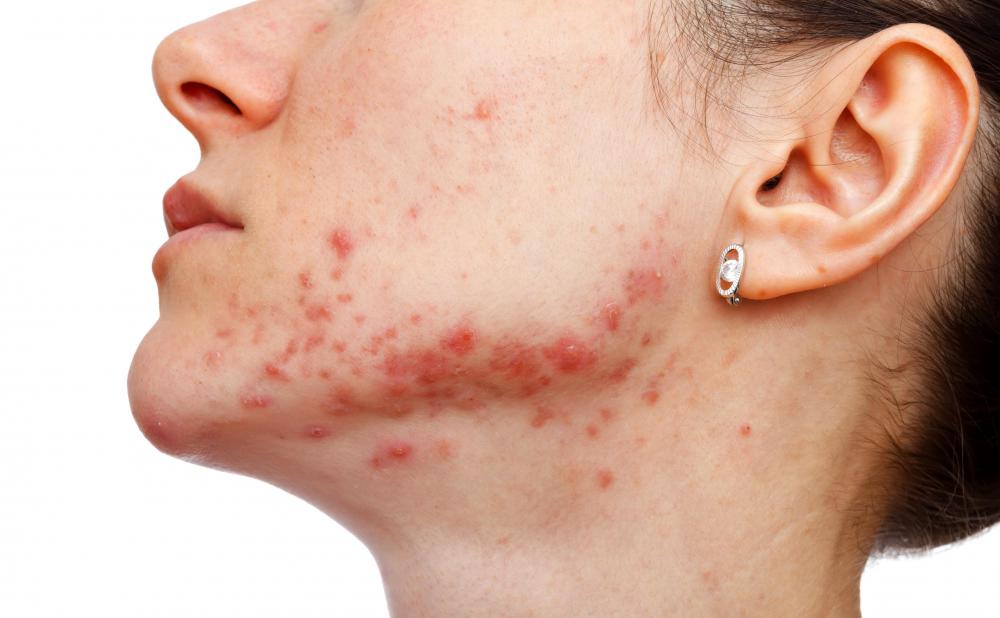At WiseGEEK, we're committed to delivering accurate, trustworthy information. Our expert-authored content is rigorously fact-checked and sourced from credible authorities. Discover how we uphold the highest standards in providing you with reliable knowledge.
What is an Infection?
An infection is caused by the invasion of foreign cells, like bacteria in humans that cause harm to the host organism. Generally the host organism is considered “colonized” by cells that don’t belong to it. These foreign cells must be harmful to the host organism in order for the colonization to be considered an infection.
There are many instances of living creatures that benefit from colonization by other cells. Two discrete organisms can have a symbiotic relationship to each other, which harms neither organism. Alternately, a colony of cells (or parasites) might have no effect on the host organism, but might benefit the colony. For example, staph and strep bacteria are commonly found on the skin of humans, and on most mammals. Unless the bacteria make the person or animal sick, this is not an infection.

There are many different types of infectious agents. Not only bacteria, but also viruses, parasites, and fungi can create problems for a host organism. Sometimes these non-host cells actually work together to keep infection from occurring. For example, if you have strep throat, you’re often given antibiotics. This is great for killing the strep cells. The problem is, humans also have a certain amount of fungi cells, called yeasts, on their body.

When regular skin bacteria and yeast are present together, they tend not to pose a problem for people. They fight each other instead of fighting the human body, so levels of each colony stay balanced. When antibiotics get introduced into the mix, suddenly, you may kill the good bacteria, which keeps yeast levels in check, in addition to the infectious bacteria. This may result in a fungal or yeast infection, since the balance of colonies has been disturbed. Antibiotics can also result in stomach upset or diarrhea, since beneficial bacteria also lives in the intestinal tract, and may be killed off by them.

Other infections occur when a foreign colony is suddenly introduced. People who travel to countries where drinking water contains a high level of parasites may introduce specific parasites into their body. Traveler’s diarrhea tends to be caused by the body’s reception of parasitic or bacterial agents. Alternately, parasitic agents like tapeworms can gradually harm humans by growing inside the body. This would be considered a parasitic infection.

Occasionally, an initial colonization of other organisms causes little harm to the host. Tapeworms can live for years in humans without the human displaying any sort of symptoms. Yet ultimately, tapeworms will cause harm, so when discovered, people usually take special worm killing medications so the tapeworms will be eliminated.
In most cases, the key to understanding infection is the concept of “harm to the host.” Whether that harm is currently being induced by the colony or an eventual cause of colonization, infections often require medical attention. The one exception to this occurs in situations where people are colonized by transient virus colonies. Generally, in healthy people, the body works to fight the infection, like the common cold, and is frequently successful. A few viruses like HIV are not successfully fought by the body and require large doses of antiviral medications in order to keep or delay the virus from causing significant damage. Some viruses remain resistant to treatment, like West Nile Virus and the Ebola virus.
AS FEATURED ON:
AS FEATURED ON:

















Discussion Comments
I think it's crazy to see just how many infections bacteria surround us every day. I remember in my high school biology class we took a saliva swab and analyzed the bacteria, and I was just floored to see how many really scary and infectious bacteria float around in the mouth. Let me tell you, the first thing I did after school that day was to brush my teeth.
If you think about how prone the human body is to them, then it's easy to get freaked out.
Eye infections are a great example of something that usually just has to be waited out. Especially if it's something from an allergy, you just have to be patient and not touch your eye too much, though of course that is also the hardest thing to do when your eye itches.
Bacterial infections sometimes go away on their own or with some sort of disinfectant if they are a topical infection; others require antibiotics. However, even an acute infection caused by a virus will not be helped in any way by antibiotics, and must be treated with fluids, rest, and healthy food. There really is no "quick fix" for most viral infections.
Infections are scary things...if you really think about how prone the human body is to them, then it's easy to get freaked out (or at least I do!)
I once read an article about a guy who had gotten a paper cut, and then went on a flight and caught some crazy infection. OK, so it's probably an urban legend, but still, doesn't that freak you out just a little bit?
I think it's crazy to see just how many infectious bacteria surround us every day...I remember in my high school biology class we took a saliva swab and analyzed it for bacteria, and I was just floored to see how many really scary infectious bacteria float around in the mouth. I know that most of the time they don't affect the body (you know, unless you're immuno-compromised or something), but still, let me tell you, the first thing I did after school that day was to brush my teeth!
Post your comments